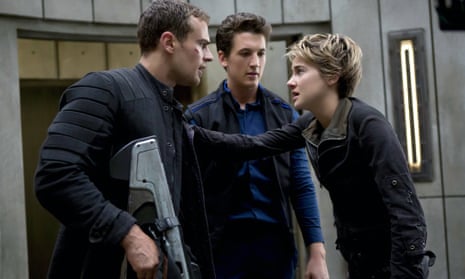The winner
The training period is over for the Divergent franchise. Industrially cut from the young-adult mould though it is – with its story of youngsters hothoused into a totalitarian society’s five specialised factions – studio Lionsgate opted for a low-risk opening with the first film, ushering it out into 18 territories last March. No such allowances for number two, Insurgent, which went out in 77 on the corresponding weekend this year, with star Shailene Woodley’s recognisability in the YA genre – thanks also to last year’s breakout hit The Fault in Our Stars – now sufficiently strong to withstand even a drastic new pixie-cut. And Insurgent seems to have held its nerve, turning out fractionally lower in the US than Divergent – $52.3m to $54.6m – but rising in virtually every key overseas market. France (Div: $3.4m; Ins: $6m) and Brazil (Div: $1.9m; Ins: $4.2m) were especially buoyant, with Woodley definitely a factor in the latter market, where The Fault in Our Stars was 2014’s No 2 film with $31m. As many reviewers have pointed out, the Matrix-influenced story material is generic, but the movie has growing awareness on its side thanks to a swell in sales for Veronica Roth’s trilogy of novels, and is well-placed to cash in at the outset of blockbuster season, in the long trough between Hunger Games instalments. What is now branded “The Divergent Series” is still relatively small beans in the YA arena, lined up beside Hunger Games’s $150m+ US debuts and even the first Twilight’s $69.6m. On the back of those brightening international figures (where The Maze Runner did nearly 70% of its business last year) though, the franchise, with two more to come, looks as if it can handle itself.
The morning after the ball

A sizeable drop (-48.5%) for Disney’s new Cinderella (with some of the older audience perhaps migrating to the racier Insurgent instead) leaves it on $122.5m US domestic. That’s only $6m shy of Maleficent at the same point, so levelling with the Angelina Jolie film’s sturdy $241.4m domestic gross isn’t just magical thinking. But Jolie panache fuelled Maleficent to $517m overseas, making it 2014’s fourth most successful film – and is not something director Kenneth Branagh has at his disposal. Cinderella waltzed out in 14 more territories this frame, but is generally performing as expected: less well than Maleficent. A $500m worldwide total looks more realistic; but crucially, pennants seem to be going up in emerging markets to indicate that the Disney Princess imprimatur is taking hold in places where Cinders, Sleeping Beauty, Belle etc previously left far lighter cultural footprints. China is several steps ahead of Maleficent at the second-week stage ($53.1m to $38m); south-east Asia is proving very loyal indeed (Singapore: -13% drop, Malaysia: -24%, Philippines: -26%); and India, with a 500K debut, opened at more than the Jolie film’s lifetime total there. It’s a sign that a Marvel Universe-style cumulative shine could be kicking in with these female-oriented pageants. If Cinderella is looking on the demure side for a studio big-hitter, then prudence is also its strength: at $95m, it cost far less than gaudy stepsisters Maleficent ($180m) or Alice in Wonderland ($150-200m).
Poison Penn
Dud of the week is $40m Sean Penn thriller The Gunman, which hobbled in at 12th place globally, its $5.9m take less than fellow sharpshooter American Sniper managed after nearly three months on tour. The latest to be pulled out of the ever-fatter “geri-action hero” file (though the term is slightly harsh on 54-year-old Penn), it looks feeble even next to big daddy Liam Neeson’s own underwhelming Run All Night – hanging in at eighth. Helmed by Taken director Pierre Morel, with a global trouble-spot fetish one step beyond that franchise’s excursions into the big bad world outside the US, why hasn’t The Gunman sparked in the chamber for Penn? It could be because, award-winning dramatic lead and character acting juggernaut though he is, Penn has zero track record as an action star. But that didn’t stop Neeson unveiling his particular set of skills to general delight in 2008. It could be that, schlepping in just two months after Taken 3 and a week after Run All Night, The Gunman is giving audiences geri-action fatigue. Another interesting theory – put forward by Forbes’s Scott Mendelson – is that Taken never did spark some kind of official kick-ass seniors movement. According to Mendelson, the films that have followed, in fact, mostly failed to reproduce its satisfyingly primal revenge set-up. The Gunman, clotted with confusing socio-political context, fails for its own reasons, and therefore shouldn’t be regarded as another point on the geri-action bell-curve.
Korean paradiddling
Damien Chazelle’s Whiplash was a surprise inclusion, in with a bang at No 15 on the international rankings on the strength of a $3m take in South Korea – all the more commendable as it opened nearly a fortnight ago there, and appears to have grown nearly 100% thanks to word of mouth (and those three Oscars can’t have hurt). The country is now its biggest market outside the US, with a $6.6m running total – nearly three times that in the UK. Drumming drillcamp-cum-quasi-sports films being thin on the ground, it’s hard to make exact comparisons, but the Keira Knightley-Mark Ruffalo indie musical drama Begin Again experienced a similar second-week bounce in South Korea, strumming its way to an eventual $24.3m. Take the out-of-the-blue success of both as testament to the country’s fecund and curious film-going culture.
The rest of the world
Hong Kong superstar Andy Lau was the sole non-Hollywood representative this week, his drama Lost and Love opening behind Cinderella in China and fifth globally. Based on a real-life 2010 case, the film is about a farmer who searched for his abducted son for 14 years – and a sombre return to the preoccupations of last year’s Chinese hit Dearest ($54m), which also drew on the country’s estimated 70,000 annual child kidnappings.
The future
It’s back to the drawing board for DreamWorks Animations, whose original offering Home – already in play in nine markets this week, including a rosy $9.1m No 1 debut in the UK – is looking to seed new franchise possibilities to complement Madagascar and How to Train Your Dragon. Centering on the friendship between a young girl (voiced by Rihanna) and a sadsack member of an alien race that invades Earth, there’s a lot riding on this garish, cutesy, slightly surreal-looking $132m confection – it being the animation division’s only release for 2015. It goes wide in a further 55 territories, including the US. Cinderella makes eyes at a clutch of big-time new suitors, including the UK, France, Spain, Australia and Brazil. And China could put Kingsman: The Secret Service – hovering a touch below $300m on the box-office radar – into the serious-money league. Its main new rival is fantasy animation 10,000 Years Later – a 3D (and unusually R-rated) extravaganza about a Tibetan girl with the power to rescue the Earth from a grim future. It is being talked up by some as a showcase for Chinese artistry that will see off Hollywood, but judging by the trailer’s visuals, it would struggle to see off in-game cut scenes from 1990s videogames.
Top 10 global box office, 20-22 March
1. (New) The Divergent Series: Insurgent, $100.5m from 77 territories – 48.1% international; 51.9% US
2. Cinderella, $77.6m from 46 territories. $255.1m cumulative – 52% int; 48% US
3. (New) Home, $19.2m from 9 territories – 100% int
4. Taken 3, $18.6m from 6 territories. $312.9m cum – 71.7% int; 28.3% US
5. (New) Lost and Love, $16.3m from 5 territories – 99.4% int; 0.6% US
6. Kingsman: The Secret Service, $13.1m from 48 territories. $295.8m cum – 61.3% int; 38.7% US
7. Focus, $11.2m from 65 territories. $120.4m cum – 59% int; 41% US
8. Run All Night, $10.1m from 24 territories. $34.9m cum – 43.5% int; 56.5% US
9. Chappie, $7.8m from 70 territories. $71.6m cum – 60.5% int; 39.5% US
10. Big Hero 6, $6.8m from 21 territories. $644.8m cum – 65.5% int; 34.5% US

Comments (…)
Sign in or create your Guardian account to join the discussion